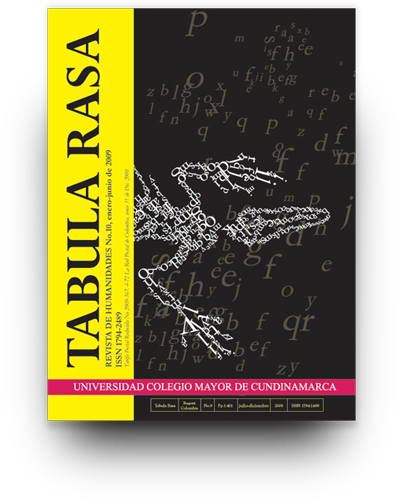Bitter sugar. The Inescapable Oximoron of Cuban History
Azúcar amarga: el inevitable oxímoron de la historia cubana
Show authors biography
Nicolás Guillén took an autonomous position in the literary field of Hispanic Caribbean in the 30’s, and built an early national hybrid identity as a cultural and aesthetic response to a historic crossroads marked by ethnic whitening, political alienation and economic dependence. Guillén went to the source of orality, where the strength of popular voice lies and recorded the semi-creole language of Cuban mulatto. The language of his early poetic machina expresses a national identity marked by the popular and a full Caribbean habitus.
Article visits 148 | PDF visits 70
Downloads
Adorno, Theodor. 2003. «Sobre la poesía tardía de Hölderlin». En: Notas sobre Literatura.
Obras Completas II, Ediciones Akal, Madrid.
Anderson Benedict 1993. Comunidades imaginadas, F.C. E. México.
Anderson Imbert, E. 1954. Historia de la Literatura Hispanoamericana, F.C.E, México.
Aponte-Ramos, Dolores. 2003. «Habladurías sobre la diferencia», Jerome Branche, (ed.), Lo que teníamos que tener: raza y revolución en Nicolás Guillén. Pittsburg Instituto Internacional de Literatura Iberoamericana, Universidad de Pittsburg, Pittsburg.
Ashcroft, Bill, Gareth Griffiths y Helen Tiffin. 1989. The Empire Writes Back. Routledge, London.
Bathwaite. E.K.1971. “Creolization in Jamaica”, The Development of Creole society in Jamaica, 1770-1820, Clarendom Press, Oxford.
Benítez Rojo, Antonio. 1987. “Nicolás Guillén and Sugar.” Callaloo, Volume0, Issue 31.
Benítez Rojo, Antonio. 1989. «Nicolás Guillén: ingenio y poesía», La isla que se repite. El Caribe y la perspectiva posmoderna, Hanover, Ediciones del Norte.
Bethell, Leslie. 1993. Cuba. A short History. Cambridge University Press. Cambridge.
Bhabha, Homi. 1984a. “Representation and the colonial text: a critical exploration of some forms of mimetism” , Ed. Frank Gloversmith. The theory of Reading, Brigthon. Harvester.
Bhabha, Homi. 1984b. “Of mimicry and man: the ambivalence of colonial discourse” October. Discipleship: A Special Issue on Psychoanalysis. Vol. 28:125-133.
Buchanan, Ian, 2000. Deleuzism: A Metacommentary, Duke UP, Durham NC.
Bürger, Peter, 1984. Theory of the Avant-Garde, U Minnesota, Minneapolis.
Cabrera Lydia, 1984. Vocabulario congo (el bantú que se habla en Cuba). Ediciones Universal, Madrid.
Carpentier, Alejo. 1979. La música en Cuba. Editorial Letras Cubanas, Ciudad de La Habana.
Couzens, David. 1978. “History, Historicity and Historiography”. Michael Murray, (ed.). Heidegger and Modern Philosophy, 329-53 Yale UP., New Haven.
Cros, Edmond. 1997. El sujeto cultural. Sociocrítica y psicoanálisis. Buenos Aires. Ediciones Corregidor.
Deleuze, Gilles, 1991. Bergsonism, Zone, New York.
Deleuze, Gilles, 1994. Difference and Repetition, Athlone, London.
Deleuze, Gilles & Félix Guattari. 1984. A Thousand Plateaus, Minnesota UP, Minneapolis.
Eco, Umberto, 2000. Tratado de semiótica general, Lumen, Barcelona.
Gonzáles Echevarría, Roberto. 1987. “Guillén as Baroque: Meaning un Motivos de Son”, Callaloo, Volume 0 Issue 31 :302-317,, Nicolás Guillén: A Special Issue (Spring).
Adelto, Gonçalves, 1990. “Nicolás Guillén: o itinerário de um poeta”, en Revista Iberoamericana, Vol. LVI, Nº 152-153, Jul.Dic.de, págs. 1171-1184.
Glissant, E. 1999. Caribbean Discourse, University of Virginia P., Charlottesville and London.
Grimal, Pierre. 1981. Diccionario de mitología Griega y Romana. Paidós,
Hernández, Consuelo. 2007. Nicolás Guillén y su legado. Middle Atlantic Council for Latin American Studies, http://www.maclas.vcu.edu/journal/Vol%20XVII/consuelo.htm, 11/09/07.
Jameson, Fredric, 1984. Postmodernism, , Duke UP. Durham NC.
Karatani, Kojin. 2005. Transcritique, MIT P., Cambridge.
Kutzinski, Vera. 2003. “Re- Reading NicolásGuillén: An Introduction”, Callaloo, Vol. 0, Issue 31.
Kutzinski, Vera. 1987. “Nicolás Guillén: a special issue”. A Journal of African and American Arts, n.º 10 (2), Baltimore, spring.
Lotman, I., 1978. Estructura del texto artístico, Istmo, Madrid.
Mackey, Louis, 1989, “Once More with Feeling”, Harold Bloom, (ed.), Søren Kierkegaard, 191-218. Chelsea House, New York.
Maglia, Graciela. 2005. «Estéticas de resistencia en la poesía del Caribe afrohispánico». En Cuadernos de Literatura, Vol. 10,N° 19, Julio-diciembre.
Márquez Roberto. 2003 «Algunos apuntes sobre Guillén y la crítica». En: Lo que teníamos que tener: raza y revolución en Nicolás Guillén. Jerome Branche, (Ed.) Serie Antonio Cornejo Polar,. Instituto Internacional de Literatura Iberoamericana. Pittsburg.
Martínez Estrada, Ezequiel, 1966. La poesía afrocubana de Nicolás Guillén, Colección: Ensayo y Testimonio, Arca/ Montevideo.
Morejón, Nancy. 1972 «Recopilación de textos sobre Nicolás Guillén», Serie Valoración Múltiple, Casa de las Américas, La Habana.
Mukarovsky, I. 1977. Escritos de estética y semiótica del arte, Gustavo Gili, Barcelona.
Naranjo, Consuelo. 2005. «Blanco sobre negro. Debates en torno a la identidad en Cuba (1898-)». En Colom Gonzáles (ed.). Relatos de nación. La construcción de las identidades nacionales en el mundo hispánico. Iberoamericana, Veuvert, Madrid.
Norris, Christopher, 1983. The Deconstructive Turn, Methuen, London.
Pizarro, Ana. 2002. El archipiélago de fronteras externas, Editorial Universidad de Santiago, Santiago de Chile.
Said, Edward, 1983. The World, the Text and the Critic, Cambridge, U Harvard.
Smart, Ian Isidoro. 1990. Nicolás Guillén –Popular poet of the Caribbean, Columbia and London, University of Missouri Press.
Summer, Doris. 1999. «El contrapunteo latino entre el inglés y el español : notas para una estética bilingüe», en Memorias del IV Seminario Internacional de Estudios del Caribe. Instituto Internacional de Estudios del Caribe y Universidad del Atlántico, Bogotá.
Ortiz, Fernando, 1917. Hampa Afro-Cubana; Los negros brujos. (Apuntes para un estudio de etnología criminal), Madrid, Editorial América.
Ortiz Fernando. 1991. Contrapunteo cubano del azúcar y el tabaco, La Habana, Editorial de Ciencias Sociales.
Patiño Roselli, Carlos. 1992. «La criollística y las lenguas criollas de Colombia». Thesaurus: Boletín del Instituto Caro y Cuervo. Bogotá. Colombia.
Willam, Luis. 2001. Cultura and Customs of Cuba. Culture and Customs of Latin America and the Caribbean, Peter Standish (ed.). Greenwood Press, London.
Žižek, Slavoj, 2002. For They Know Not What They Do, Verso, London.
Žižek, Slavoj, 2004. Organs without Bodies, Routledge, London.
Žižek, Slavoj, 2006. The Parallax View. MITP, Cambridge.




